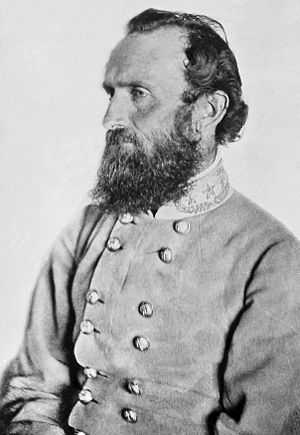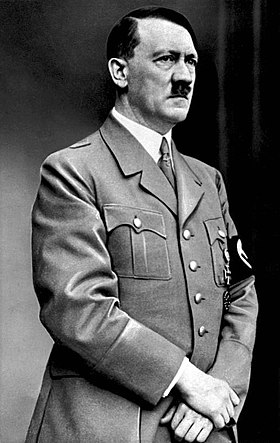 |
| Gen. Thomas "Stonewall" Jackson |
Showing posts with label military history. Show all posts
Showing posts with label military history. Show all posts
Jackson's Valley Campaign
Written by
Joshua Horn
on Wednesday, May 23, 2012
/
Comments:
0
The Mistakes of World War 2 - 1942
Written by
Joshua Horn
on Tuesday, January 18, 2011
/
Comments:
5
Mistakes of World War 2
- Causes of the War
- The Mistakes of 1939-1940
- The Mistakes of 1941
- The Mistakes of 1942
- The Mistakes of 1943-1945 More coming soon
 | ||
| The Three Leaders of the Allies: Joseph Stalin Franklin Roosevelt and Winston Churchill |
This article is the fourth part in a series on the greatest mistakes of World War II. At this point in the war it is 1942 and America, Great Britain and the Soviet Union are united against Germany, Italy and Japan. Many of the great mistakes of the war had already been made, but there were still mistakes that the Axis made that shortened their life, even if they were already doomed to defeat. I will discuss three mistakes that were made in 1942 – the failure of the Germans to press the attack by the U-boats, the Japanese attacks in the Pacific, and Hitler’s refusal to retreat from Africa.
Written by
Joshua Horn.
Labels:
articles,
Joshua,
military,
military history,
Mistakes of World War 2,
Winston Churchill,
world war 2
.
Comments:
5

The Mistakes of World War 2 - 1939-1940
Written by
Joshua Horn
on Friday, May 14, 2010
/
Comments:
4
Mistakes of World War 2
by Joshua Horn- Causes of the War
- The Mistakes of 1939-1940
- The Mistakes of 1941
- The Mistakes of 1942
- The Mistakes of 1943-1945
 |
The Battle of France
At the beginning of the war there was what Churchill called the “Twilight War”. It was the eight months when war had been declared, but had only partially begun. During this time Germany crushed Poland and other nations while the French and British army was waiting on the border of France, building their armies and fortifying themselves. During 1939 through the spring of 1940 the German army improved in quality. They were able to hone their techniques upon the smaller nations before they attacked the stronger France. On the other hand the French army declined in quality. They waited on the border in their forts for the German attack, and their morale and discipline declined.
Written by
Joshua Horn.
Labels:
Adolf Hitler,
Battle of Britain,
Battle of France,
France,
Germany,
military history,
military mistakes,
Mistakes of World War 2,
Winston Churchill,
world war 2
.
Comments:
4

The Mistakes that Caused World War 2
Written by
Joshua Horn
on Wednesday, March 24, 2010
/
Comments:
4
Mistakes of World War 2
World War I, the bloodiest war in human history up to that time, ended in 1918. Germany and Austria had finally been driven back and defeated by the Allies (England, France, America, Russia and others.) The Allies were tired of war. Tens of thousands of British and French men had been killed for mere feet of ground. The casualties had been terrible. In England one out of every three males were casualties. The Allies believed that there would never be another World War because they had fought and won the "War to End All Wars." To make certain of that, they put stringent barriers in the Treaty of Versailles to make sure Germany would never be a threat again. Twenty years later, the same Allies were again fighting Germany. Today we will examine what mistakes that they made to cause the Second World War.
Adolf Hitler, the leader of Germany
One of the most important mistakes that the Allies made between the World Wars was that they allowed Germany to rebuild their army. In the Treaty of Versailles, Germany was allowed only 100,000 soldiers, a 30 ship navy, no conscription (draft), no officer's school, no submarines, and no airforce. They claimed that they obeyed this requirement at the beginning, but they disobeyed it in hiding. For example, they still fostered a civilian air foce that they would be able to turn into a military one. The Allies disarmed themselves, but they allowed Germany to gradually build up their military and violate the requirements of the treaty without any punishments. Winston Churchill said, "Once Hitler's Germany had been allowed to rearm without active interference by the Allies and former associated Powers, a second World War was almost certain."1 In 1932 Germany announced that it would no longer abide by the treaty ristrictions on armaments, and much of the Allied press agreed, because they thought that it was unfair for only the Germans to be required to disarmed. In 1935 Hitler instituted compulsory military conscription, and later England agreed that Germany should be allowed to expand its navy. Up until 1934, the Allies were still strong enough that they could have avoided a war by requiring Germany to disarm, but they did not. Instead, they remained at ease while the Germans built up a military stronger than their own. Winston Churchill said, "[T]he strict enforcement at any time till 1934 of the Disarmament Clauses of the Peace Treaty would have guarded indefinitely, without violence or bloodshed, the peace and safety of mankind. "2
Hitler reviewing his troops
The other main problem was that the Allies allowed Germany to annex and attack other nations without resisting until it was too late. In 1936 Hitler ordered the Rhineland to be occupied, which was supposed to be a demilitarized zone on the border of Germany. The Allies did nothing. In 1938-1939 Germany annexed Austria and attacked Czechoslovakia. By this time the Allies had already allowed Germany to gain an army, but it was still weaker than their own. If they had wished, they could have used their greater force to threaten Germany and avert a greater war. It should have been clear to them that although each time Hitler said that this was all the land he wanted, his desire was to conquer the world. But instead they allowed Germany's aggression and refused to stop them. But finally the English prime mister realized what was happening and declared that they would not allow Germany to take over Poland, their next target. He said,
"Is this the last attack upon a small State or is it to be followed by another? Is this in fact a step in the direction of an attempt to dominate the world by force?"3England promised their support to Poland if it was attacked. But they had already made their mistake, and were destined for a long war. They had refused to act when the German army was weak, and now would have to fight it when it was strong. Churchill said, "Here is a catalogue of surrenders, at first when all was easy and later when things were harder, to the ever-growing German power. But now at last was the end of British and French submission. Here was the decision at last, taken at the worst possible moment on the least satisfactory ground, which must surely lead to the slaughter of tens of millions of people."4
These were the mistakes that the Allies made that led up to and caused the Second World War. They should be a lesson to us not to be lazy and allow things that will surely lead us into war. Churchill said,
"Still, if you will not fight for the right when you can easily win without bloodshed; if you will not fight when your victory will be sure and not too costly; you may come to the moment when you will have to fight with all the odds against you and only a precarious chance of survival. There may even be a worse case. You may have to fight when there is no hope of victory, because it is better to perish than to live as slaves."5
1 Churchill, Winston. The Second World War. (London: Cassell & Co. Ltd 1948) volume 1
2 Ibid, p. 13
3 Ibid, p. 270
4 Ibid, p. 271-272
5 Ibid, p. 272
Written by
Joshua Horn.
Labels:
Adolf Hitler,
military history,
military mistakes,
mistakes,
Mistakes of World War 2,
Winston Churchill,
world war 2
.
Comments:
4

Military Mistakes of World War 1 - Part 2
Written by
Joshua Horn
on Wednesday, January 06, 2010
/
Comments:
3
Mistakes of World War 1
- Part 1
- Part 2

by Joshua Horn
View Part 1
View Part 1
In part one we examined three of the mistakes of World War I, one of the biggest wars in world history. These were the German navy's failure to attack at the beginning of the war, the Allies' frontal attacks and the Allied defeat at the battle of the Dardanelles. Today we will examine three more of the mistakes of World War I, the continued attacks of the Allies, the German U-boat war and the German frontal attacks. All these mistakes, and many more, contributed to create one of the bloodiest wars of human history. World War I changed Europe forever. In Britain alone one third of the male population were casualties. We should learn from these costly mistakes of history so that we will not make similar errors.
Read More
Written by
Joshua Horn.
Labels:
article,
book report,
British,
French,
Germans,
Joshua,
military,
military history,
tanks,
trench,
U-Boat,
Winston Churchill,
World War 1,
writing
.
Comments:
3








